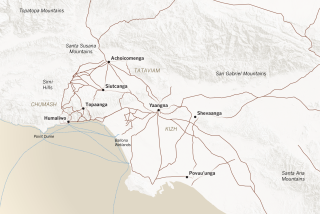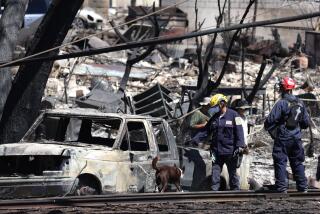Era Ends in Death of Last Full-Blooded Kwaaymii
- Share via
The last full-blooded Kwaaymii Indian, Tomas Lucas, 87, died Thursday on the land where his forebears had lived for centuries.
Lucas was born during a snowstorm in 1903 in the same area of the Laguna Mountains in northeastern San Diego County where he died. He attended public school and later moved away from the reservation and married an Anglo woman. During World War II, he moved with his family to the Pacific Beach neighborhood of San Diego, working in defense industries and later for a San Diego building contractor. He retired at 70.
About five years ago, he returned to the Lagunas, to the former Kwaaymii reservation land where he had been raised.
The 320-acre Lucas Ranch was once the home of the tribe, who lived high in the Laguna Mountains most of the year, moving their entire village down to the desert during the coldest months of winter.
During his final years, Lucas told and retold the story of his people to anthropologists and archeologists who visited his home off Sunrise Highway. His voice took on a sing-song quality as he repeated the legends that had been taught him as a youth, stories of the abundance of nature and the heroic deeds of his ancestors.
The Kwaaymii elders, aware that he was the last of the tribe, forced the young members to learn and repeat the tribal history, and in recent years Lucas, despite failing hearing and eyesight, repeated it hundreds of times to educators and scientists who sought him out.
“I guess that I’m the only one today that remembers the past,” he told a reporter last year. “I was the only child and no kids to play with. At night, I was bound to listen. Listen to stories, listen to prayers.
“By keeping my ears open, as I most generally have, I picked up quite a few things. Some things I wasn’t supposed to know I heard anyway.”
Children of Spencer Valley School near Julian and their teacher, Luanne Lynch, often visited Lucas to hear his tales. Lynch, with the aid of a school video camera, captured hours of Lucas’ monologues and calls them “invaluable” because of his clear memory and voice.
Lucas told of his people being decimated by white men’s diseases--scarlet fever and influenza--and of being driven off their lands by settlers seeking rangeland for their cattle.
When Lucas was born in 1903, the Kwaaymii no longer made the journey down to the desert in winter for fear that white ranchers would seize their mountain lands while they were away. But Lucas could point out the trail down the mountain to Mason Valley that his ancestors took and would describe the pile of tiny pebbles that grew to a mound because each passing Indian would toss on a stone to ask the Great Spirit for a safe journey.
His land contains the site of a Kwaaymii village whose residents were wiped out in some mysterious way. Lucas speculated to a reporter that the mass deaths were from food poisoning, ptomaine probably, caused from some contamination in a communal meal.
There are metate holes that Indian women, including his mother, used to grind acorns into meal. There are meadows where deer and other game were plentiful and where yellow buttercups formed lush carpets in the spring after winter rains.
Lucas’ mother, Maria Alto, also lived in both the Indian and Anglo worlds, becoming an accomplished horsewoman, an artist and a successful cattle rancher. She fought to have her son enrolled in a “white school,” where he could learn English and receive an education.
Lucas’ daughter, Carmen, said her father fought for 18 years to obtain title to the Kwaaymii lands, which were his right as the last surviving member of the tribe. She said the deed of patent was finally approved by Congress and signed by then-President Harry Truman in 1947.
In his final days, Lucas contracted pneumonia, Carmen Lucas said.
“He knew he was dying. He told us so. He told us of his disturbing dreams where he was surrounded by angels, but when he reached out to touch them, their wings turned to paper,” she said.
Carmen Lucas and her sister, Jacquelyn Pfingst of San Diego, and three grandchildren survive him.
His funeral services, like his life, will include Indian and Anglo elements. Tentative arrangements call for a visitation from noon until 8 p.m. Tuesday at Paris-Frederick Mortuary in El Cajon. His body will then be taken to Lucas Ranch, where an all-night wake is scheduled to begin at sunset Wednesday.
Burial services are tentatively scheduled for 10 a.m. Thursday at the burial grounds on the Lucas Ranch, where his mother and more than 90 other Kwaaymii ancestors lie.
More to Read
Sign up for Essential California
The most important California stories and recommendations in your inbox every morning.
You may occasionally receive promotional content from the Los Angeles Times.










